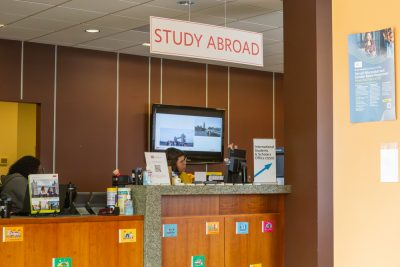By Amelia McAvoy and Kiera McDonald
Many students expressed frustration after being placed on the Boston University Study Abroad waitlist due to increasing interest for the Spring 2024 semester.
Gareth McFeely, the executive director of BU Study Abroad, estimated there will be about 2,400 applicants this year and advises students to apply as soon as they have made their decision to study abroad because some programs are on a first-come-first-serve basis.

“Most students go abroad their junior year and the number of students admitted to BU two years ago was large,” he said. “As a consequence, you’d expect to see more students applying.”
McFeely said in addition to larger-than-average class sizes, “students and their families were more reluctant to do overseas travel,” because of the recent recovery from COVID-19, there has been an upsurge of applicants.
At least four programs have waitlists as a result of their popularity, including the London internship programs for economics/finance, journalism and pre-law tracks and the pre-law track for the Sydney internship program.
Currently, the University offers over 75 different programs in more than 20 countries around the world. The majority of these programs can be accessed both by students at BU and students attending other institutions nationwide.
BU was the first university to offer students internship opportunities abroad on multiple continents and one of the first to send students abroad.
McFeely said BU Study Abroad will try to “balance the level of interest” but are constrained by the lack of housing and internships.
“Overseas, we have about 450 students, but we will probably have at least twice that number abroad in the spring,” McFeely said. “That’s one of the reasons why we have waitlist situations or programs closing early because of the difference in popularity between the two semesters.”
Abby Bodnar, an academic advisor in the College of Communication, said she noticed the rise in demand for study abroad and encouraged students on the waitlist to find an alternate program if their first choice did not work out.
“Students whose program got full would be put on a waitlist, which is something new but also not, I would say, unheard of,” Bodnar said. “A lot of students in COM do want to study abroad.”
Bodnar said many students opt against studying abroad during the fall semester since going in the spring allows them to go through the regular housing process and avoid being “last choice” for housing if they studied in the fall.
“I think as long as the student can arrange housing to where they will be able to go in the fall, they might get their first choice easier,” Bodnar said.
Bodnar said COM advisors must approve student applications and ensure they have met the right prerequisites for the program they have selected.
Peri Bolognese, a junior in the College of Arts and Sciences, said she got a concussion last spring and was ultimately waitlisted because she was unable to submit an application to the Geneva, Switzerland program until two days before the deadline.
Bolognese said she reached out to her program manager about her incomplete grades and believed there would be no issues applying to the program.
“She was kind of implying that it was all going to be fine, there was enough room,” Bolognese said.
Bolognese has since made the decision to switch her application to the Sydney program, but she said she wished her experience had been different.
“This was a program I really was interested in, looking forward to,” Bolognese said. “I definitely wish I had applied earlier. I just had some obstacles.”
Despite not getting accepted into his first choice program, Lorenzo Mendiola, a junior in COM, said he still enjoyed his experiences abroad.
Mendiola said the transition to the Sydney program was “pretty simple” after he applied in January to the London program and was waitlisted.
“Honestly, I loved it so much and I think things happen for a reason,” Mendiola said.
Mendiola said he got exactly what he wanted at an independent advertising agency in Australia, where the people and staff were very friendly. With fewer people, Mendiola felt students formed a closer bond and, specifically for the summer, there was less competition for internships.
“I think the return value of [the Sydney Program] is a little bit better,” Mendiola said. “Maybe I’m just biased, but it’s good so far. I think I really enjoyed it.”
Bridget Griffith, a junior in CAS, said she switched to the Dublin program after being waitlisted for the London program and was surprised by the waitlist decision after students and staff initially told her there would be no issues.
“It was kind of honestly a bit of a shock because I felt like every time I talked to someone about studying abroad and stuff, both in terms of other students, and then people who worked at the Study Abroad office, they were like, ‘pretty much everyone gets in,’” Griffith said.
Griffith said she “loved” her experience in Dublin and said the decision helped her in the “long term.”
“I think, personally, it ended up for the better,” Griffith said. “I really loved doing the Dublin program and glad that I did that over the London program.”























































































































